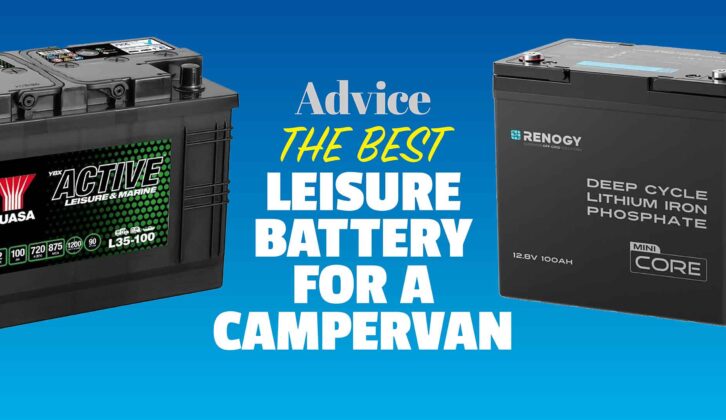The best campervan leisure battery will allow you to enjoy one of the joys of van life – being able to pitch up without electric hook-up. This means you can stay at some of the standout locations across the UK and Continental Europe without being tied to a campsite.
That’s because a leisure battery for a campervan allows you to use 12-volt powered accessories, such as lighting, your water pump, your fridge and a television no matter where you are on the road. As a result, your milk will be kept cool while you’re driving, so you can enjoy a cup of tea when you’ve stopped in a picturesque layby on a long journey, whether you’re heading to one of the best campervan sites UK or are going off-grid.
Campervan leisure batteries are usually recharged via your vehicle’s alternator when you’re driving, so it’s easy to top up their power. It should also charge when you’re using electric hook-up, or via a trickle charger, solar panel or other add-on system – so it’s easy to keep the battery topped up when the vehicle is parked up for the winter.
Because of their importance in your campervan’s electrical systems, it’s crucial that you choose the correct type for your needs.
They may cost more as an initial outlay, but lithium batteries are ideal for those who want additional power for a longer duration. If you’re on a budget and happy with less power, a lead-acid battery is likely to be sufficient. You should always make sure that a battery you’re considering fits into its dedicated, secure space in your campervan.
Don’t forget too, if you’re after more power when you’re on the road, picking one of the best portable power stations for van life could make a big difference.
Here, we’re sharing our favourite picks on the market for the best campervan leisure battery, three of which are lead-acid, and three of which are lithium examples.
Practical Motorhome is supported by its audience. When you purchase through links on our site, we may earn an affiliate commission. Learn more
The best campervan leisure batteries:
Standard campervan leisure batteries
Yuasa L36 AGM
Halfords HLB700
Yuasa L35-100
Lithium leisure batteries for campervans
MOSEWORTH LiFePO4 Leisure Battery
Litime LiFePO4 Lithium Battery
Renogy Mini-sized Battery
The best leisure battery for a campervan:
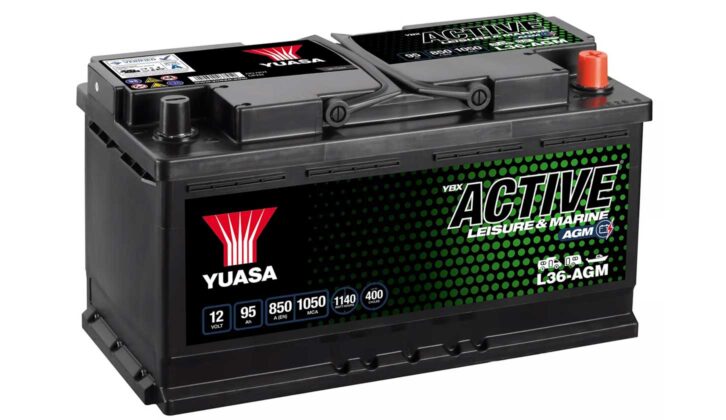
Yuasa L36 AGM
- Output: 95Ah
- Size (LxWxH): 335 x 175 x 190mm
- NCC rating: A
Reason to buy:
- Designed to be spill-proof, in-built handles for easier portability
Reason to avoid:
- Output is relatively low compared to other options in our guide
Fibreglass mats absorb the lead acid in this battery from well-known brand Yuasa; it features an AGM (absorbed glass mat) design, which means that it’s well protected against damage and spillage during hard use because the acid isn’t free to move around within the unit.
It’s ideal for those who have high-consumption systems in their campervan, such as auto-levelling, because it is a deep-cycle unit offering up to 1140 watt/hours. Regular charging and discharging will allow for optimal output.
Even best campervan leisure batteries can be heavy (this one weighs 25.6kg), so the in-built carry handles will make moving it more easy. It also has a two-year warranty for additional peace of mind.
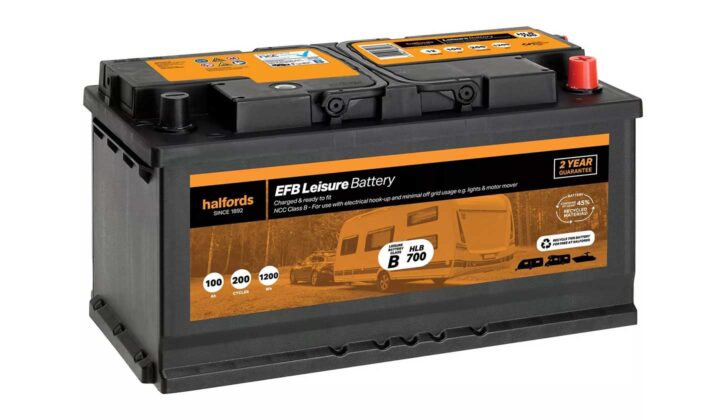
Halfords HLB700
- Output: 100Ah
- Size (LxWxH): 353 x 175 x 190mm
- NCC rating: B
Reason to buy:
- Can be used straight away
Reason to avoid:
- At 24kg, relatively heavy
As with the Yuasa L36 AGM, this Halfords own-brand battery – which offers up to 1200 Watt/hours and 100Ah – has a two-year warranty. Its output means that it’s a good option for those campervanners who require more power when they’re out and about on the road, perhaps for auto-levelling or other high-powered accessories.
It also features a carry handle, as well as an integrated flame arrestor, which is a useful safety feature for additional peace of mind. In addition, you’ll find it already charged after you’ve purchased it, so you’ll be ready to hit the road straight away.
As with all lead-acid batteries, this one is fairly heavy – it weighs in at 24kg – so you’ll need to ensure that you have plenty of payload available before fitting it.
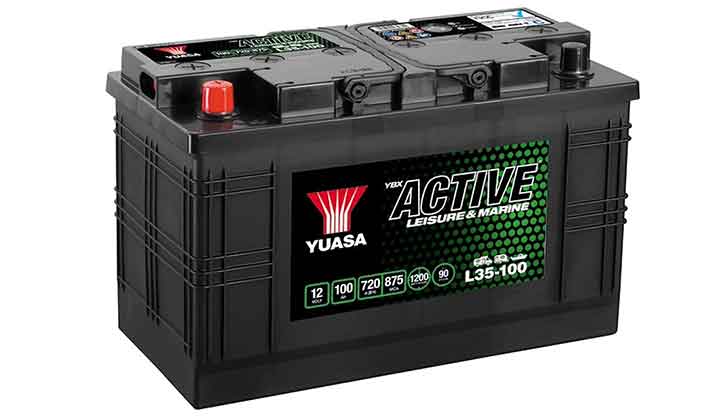
Yuasa L35-100
- Output: 100Ah
- Size (LxWxH): 346 x 224 x 173mm
- NCC rating: C
Reason to buy:
- Reasonably priced, made by a well-known name
Reason to avoid:
- NCC C-rated, so will allow for only minimal off-grid use
If you like the look of the Yuasa L36 AGM battery featured above, but your budget doesn’t stretch quite that far, then its sister model – the L35-100 – could well be worth a look. We’d suggest this one is best if you plan to use electric hook-up when you go on tour, though, because it has an NCC rating of C, as opposed to the L36’s A rating.
That aside, there’s plenty to like with this cheaper battery. It offers 90 cycles at 1200 Watt/hours, and like its sibling it should prove maintenance free. An integrated flame arrestor is fitted for additional safety and peace of mind, while the fitted carry handle will make lifting and transporting it easier. It’s slightly lighter than the L36, but still comes in at a weighty 24.7kg.
Check the latest price on Amazon now.
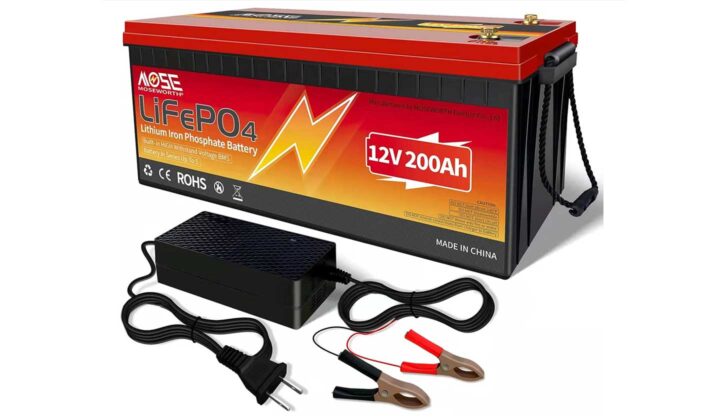
MOSEWORTH LiFePO4 Leisure Battery
- Output: 200Ah
- Size (LxWxH): 522 x 240 x 219mm
- NCC rating: N/A
Reason to buy:
- Godo for off-grid adventures and touring all year
Reason to avoid:
- Will have to ensure it fits your ‘van’s battery locker
As with the Renogy 200Ah, this is another large-dimension campervan leisure battery – so you’ll need to make sure it fits in your campervan’s battery locker – that offers a large amount of power, making it useful for those who enjoy going off-grid on their tours.
Neat features that you’ll appreciate on this leisure battery include a charger unit, and the two-year warranty means that you can buy with peace of mind, knowing that you’re covered if something goes wrong.
This is a good choice for those campervanners who tour all year, because the manufacturer states that 90% efficiency is possible, even when temperatures outside are low. You can connect up to five of these batteries in series, to create an even larger power bank for off-grid travel.
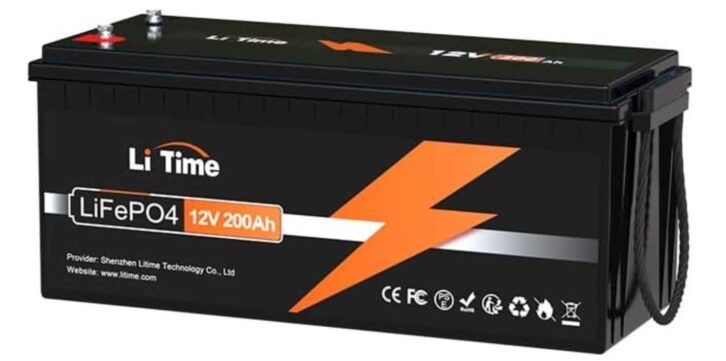
Litime LiFePO4 Lithium Battery
- Output: 200Ah
- Size (LxWxH): 330 x 172 x 216mm
- NCC rating: N/A
Reason to buy:
- Powerful but reasonably light in weight
Reason to avoid:
- No NCC rating, and fairly pricey
Litime isn’t a brand that we know particularly well, but the reviews for this one are positive, so we think it’s definitely worth considering in your hunt for the best campervan leisure battery. Its specification is certainly promising, too, offering 200Ah and between 4000 and 15,000 cycles. The manufacturers also claim that it has a service life of 10 years.
The onboard battery management system should help prevent overcurrent, short circuiting, overcharging and more, and we also like the fact that this lithium battery is more compact than the others featured here. It’s reasonably light, too, coming in at 19.95kg.
Check the latest price on Amazon.
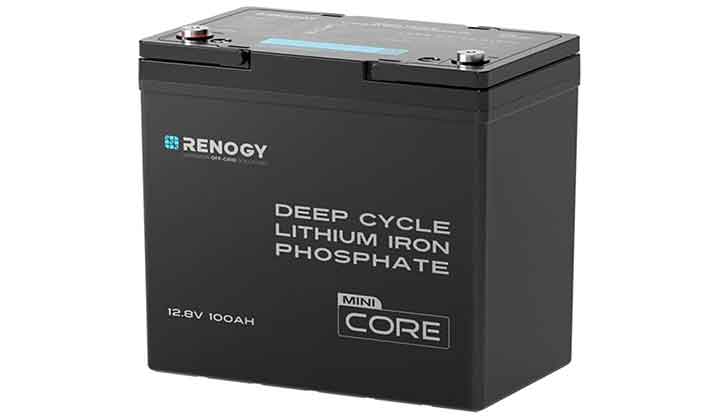
Renogy Mini-sized Battery
- Output: 100Ah
- Size (LxWxH): 229 x 213 x 138mm
- NCC rating: N/A
Reason to buy:
- Compact, light in weight
Reason to avoid:
- Lower power than other lithium models here
If you’d like the convenience and practicality of a lithium leisure battery, but are happy to go for something a bit cheaper and compact, then take a look at the Renogy unit. It offers 100Ah, but it’s surprisingly compact, so is a good option if you have limited space in your campervan.
Those smaller dimensions also mean that it’s lighter in weight, too, at just 9.9kg – handy if payload is likely to be an issue for you.
Despite its size, the vibration-resistant Renogy mini-sized battery offers plenty of tempting features, including a 100A battery management system to help protect against both low and high temperatures, overcurrents and much more. The manufacturers also state that it will offer 5000 cycles at 80% DoD.
Check the latest price on Amazon now.
What do NCC ratings mean when I’m choosing a leisure battery for a campervan?
The National Caravan Council (NCC) publishes its own ratings on leisure batteries, to help ‘van owners decide which is the best campervan leisure battery for their needs. Here’s what they mean:
- Class A – Motorhomes/caravans frequently used without electrical hook-ups
- Class B – Motorhomes/caravans with higher power consumption (for example with a motor mover) but still generally used with electrical hook-up
- Class C – Motorhomes/caravans with low power consumption used with an electrical hook-up
How long does a campervan leisure battery last?
It depends on how much you’re planning to use it! Other things to consider when it comes to how long a campervan leisure battery lasts is how you recharge it, as well as the battery’s quality.
Ideally, we would recommend not discharging a lead acid campervan leisure battery below 12.2V. Despite the ‘12V’ name, this is actually around 60% of a full charge – when it’s completely charged, a leisure battery should hold around 12.6V or more.
If you use your campervan leisure battery regularly, and maintain it well, you might expect it to last around five years. A lithium battery, meanwhile, could last significantly longer – perhaps even in excess of a decade.
What size leisure battery do I need for my campervan?
The simple answer is, the best campervan leisure battery is likely to be the one that offers enough power for your needs – and preferably more. This should allow you to power all of your campervan kit, even the more high-powered items, with ease.
Having said that, lithium batteries are the most powerful, but cost also comes into play. If you’re on a tight budget, a lead-acid battery could be a better option, especially if you can pair it up with additional charging in the form of (say) solar panels.
As well as power, you should also take a look at the weight of the battery. No matter which you choose, it will consume some of your payload – if the latter is limited, then this factor will also become even more important to you.
Although with weight comes dimensions, too – always be sure to check the size of your battery compartment before buying a campervan leisure battery, to make sure you don’t purchase something that won’t fit the space available.
Warranties or guarantees are also useful to have, in case something goes wrong with your campervan leisure battery.
If you’re looking for some extra space for keeping your food chilled when in your ‘van, our guide to the best cool box for a campervan is certain to help you find the product for you.
If you’ve enjoyed reading this article, why not get the latest news, reviews and features delivered direct to your door or inbox every month. Take advantage of our brilliant Practical Motorhome magazine SUBSCRIBERS’ OFFER and SIGN UP TO OUR NEWSLETTER for regular weekly updates on all things motorhome related.
